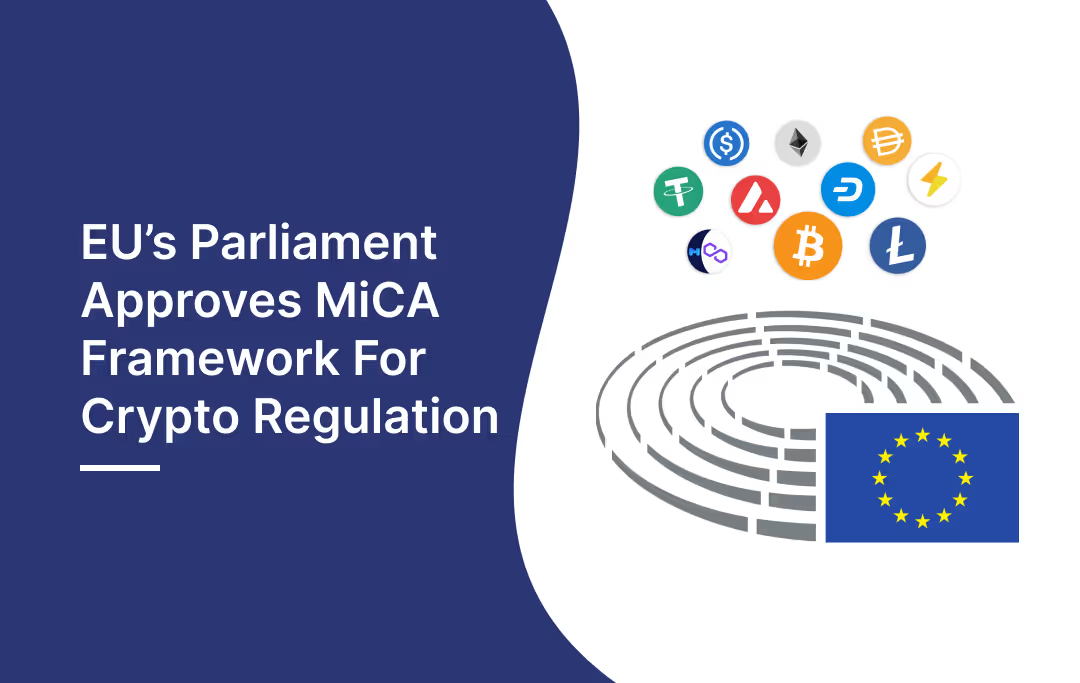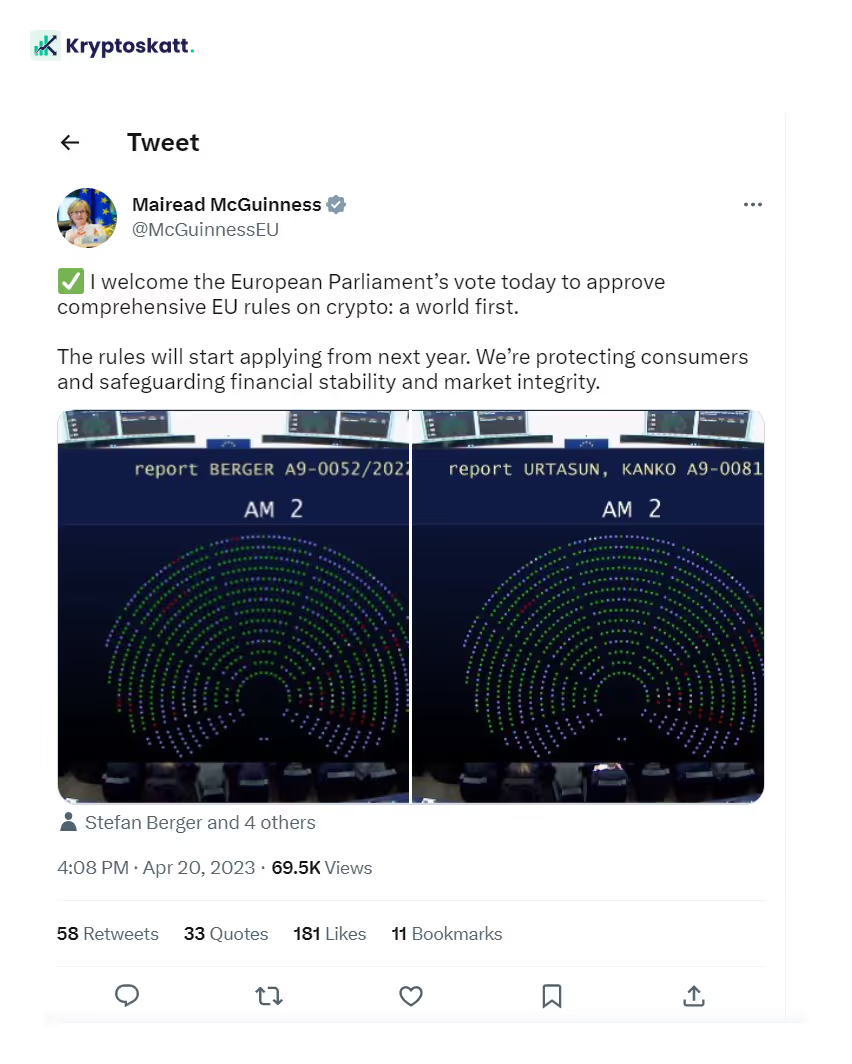.avif)
Calculate Your Crypto
Taxes in Minutes

The European Union Parliament passed a positive verdict for the Market in Crypto assets (MiCA) regulatory framework, approving its official implementation in early 2026.
MiCA’s much-needed approval comes after the prominent collapses of big crypto players including FTX, Celsius, and Voyager. The framework ensures the protection of investors from further project failures and has been overwhelmingly accepted in the EU parliament with a vote of 517 for and only 38 against.
Mairead McGuinness, the European Commissioner for Financial Stability, Financial Services, and the Capital Markets Union gladly welcomed MiCA as the world’s first comprehensive crypto rulebook to safeguard investors and create a sustainable market.

MiCA: What It Is And Why It Matters
MiCA, or Market in Cryptoassets, is a new crypto regulation framework which requires crypto asset services providers (CASPs) to gain licenses from legal authorities before entering the EU market.
It primarily covers crypto assets that are not currently governed by the existing EU laws. For instance, electronic money tokens or asset-referenced tokens fall under the scope of MiCA.
The MiCA will be progressively implemented over the next two years with regulation of stablecoins taking place in July 2024. This will require the crypto providers to have trading caps on non-euro-denominated tokens not backed by fiat currency, and also maintain fund reserves. The broader MiCA rules governing these crypto platforms will come into effect by early 2026.
The European Banking Authority and the European Securities and Markets Authority will be responsible for ensuring compliance by the crypto platforms. They will also look into certain MiCA guidelines before its final implementation.
The rules have been developed for three years as an alternative to the US approach of regulating through enforcement which has been making companies like Bittrex move out of the state.
However, the EU’s decision is being considered to bring a new era in the development of cryptocurrency regulations. For instance, investors can opt for MiCA-approved crypto platforms over others to ensure financial security. This will also attract more crypto service providers to build in the EU market.

What's In The Future With MiCA?
The approval of MiCA as the first regulatory guideline is expected to raise the bar of crypto legislation worldwide. It will also encourage crypto adoption as more consumers can invest in crypto platforms approved by legal authorities.
The “travel rule” used in traditional finance will now also apply to crypto where the exchanges have to provide the sender and recipient information for transactions to authorities. This will also be applicable for transfers above €1,000 from self-hosted wallets.
Taking about the MiCA implementation, Binance CEO Changpeng Zhao earlier tweeted,
“The European Parliament voted for MiCA to be implemented.
This means one of the world’s largest markets is introducing tailored regulations for crypto to protect users and support innovation.
The fine details will matter, but overall we think this is a pragmatic solution to the challenges we collectively face. There are now clear rules of the game for crypto exchanges to operate in the EU. We’re ready to make adjustments to our business over the next 12-18 months to be in a position of full compliance.”
As of now, crypto lending, NFTs and DeFi are not included in the legislation which still keeps scope for improvement in the current set of laws.
But even then, MiCA comes as the first step towards a larger global crypto adoption and regulation fostering innovation in this space.
MiCA and Its Impact on EU Crypto Investors
With MiCA regulations 2026, the European Union has positioned itself as the first region to adopt a comprehensive legal framework for crypto markets. For investors, this means greater consumer protection, transparency, and financial security when using EU-approved crypto platforms. Unlike the US enforcement-first approach, MiCA provides a clear set of rules for crypto exchanges, stablecoin issuers, and CASPs (Crypto Asset Service Providers), ensuring that companies must meet strict licensing and compliance requirements.
By standardizing rules across the EU, MiCA reduces risks for investors and makes crypto trading safer, more reliable, and legally protected.
Why Compliance Tools Like Kryptos Are Essential
For businesses and investors, staying compliant with EU crypto tax rules and MiCA guidelines will be critical in 2026. Platforms like Kryptos crypto tax software help users maintain accurate records, calculate gains under multiple cost-basis methods, and generate MiCA-ready reports for regulators and tax authorities.
Benefits of using Kryptos alongside MiCA regulations:
- Automates transaction tracking across wallets, exchanges, and blockchains.
- Generates EU-compliant tax reports for individual and institutional investors.
- Prepares audit-ready records to support CASPs under MiCA licensing.
- Helps users apply the travel rule by tracking sender and recipient data.
- Saves time and reduces compliance errors during regulatory checks.
Kryptos empowers EU investors and service providers to adapt quickly to MiCA’s requirements while staying fully compliant with crypto tax obligations.
Looking Ahead: Global Ripple Effects of MiCA
The approval of MiCA crypto regulation in Europe is expected to set the tone for global lawmakers, pushing other regions to adopt similar frameworks. While NFTs, DeFi, and crypto lending are not yet fully regulated under MiCA, the EU has left the door open for future legislation. For investors and companies, this provides a predictable legal foundation that fosters innovation, investment, and trust in the European crypto market.
FAQs
1. What is the MiCA rule in crypto?
MiCA, or Market in Cryptoassets, is a new crypto regulation framework which requires crypto asset services providers (CASPs) to gain licenses from legal authorities before entering the EU market.
2. Has MiCA been passed?
The European Union Parliament passed a positive verdict for the MiCA crypto regulatory framework, approving its official implementation by early 2026.
3. Is Bitcoin covered by MiCA?
MiCA covers crypto assets which are not already governed by existing EU regulations, for instance, e-money tokens or asset-referenced tokens.
4. Is the EU directive for Blockchain?
The EU is building an EU-wide blockchain regulatory framework to ensure uniformity in legislation and to protect consumers while fostering innovation in this space.
5. Is the EU making Bitcoin traceable?
The EU travel rule that is set to be implemented in the crypto will ensure that all transactions become traceable and the CASPs can detect and prevent sanctioned transfers.
All content on Kryptos serves general informational purposes only. It's not intended to replace any professional advice from licensed accountants, attorneys, or certified financial and tax professionals. The information is completed to the best of our knowledge and we at Kryptos do not claim either correctness or accuracy of the same. Before taking any tax position / stance, you should always consider seeking independent legal, financial, taxation or other advice from the professionals. Kryptos is not liable for any loss caused from the use of, or by placing reliance on, the information on this website. Kryptos disclaims any responsibility for the accuracy or adequacy of any positions taken by you in your tax returns. Thank you for being part of our community, and we're excited to continue guiding you on your crypto journey!
| Step | Form | Purpose | Action |
|---|---|---|---|
| 1 | 1099-DA | Reports digital asset sales or exchanges | Use to fill out Form 8949. |
| 2 | Form 1099-MISC | Reports miscellaneous crypto income | Use to fill out Schedule 1 or C. |
| 3 | Form 8949 | Details individual transactions | List each transaction here. |
| 4 | Schedule D | Summarizes capital gains/losses | Transfer totals from Form 8949. |
| 5 | Schedule 1 | Reports miscellaneous income | Include miscellaneous income (if not self-employment). |
| 6 | Schedule C | Reports self-employment income | Include self-employment income and expenses. |
| 7 | Form W-2 | Reports wages (if paid in Bitcoin) | Include wages in total income. |
| 8 | Form 1040 | Primary tax return | Summarize all income, deductions, and tax owed. |
| Date | Event/Requirement |
|---|---|
| January 1, 2025 | Brokers begin tracking and reporting digital asset transactions. |
| February 2026 | Brokers issue Form 1099-DA for the 2025 tax year to taxpayers. |
| April 15, 2026 | Deadline for taxpayers to file their 2025 tax returns with IRS data. |
| Timeline Event | Description |
|---|---|
| Before January 1, 2025 | Taxpayers must identify wallets and accounts containing digital assets and document unused basis. |
| January 1, 2025 | Snapshot date for confirming remaining digital assets in wallets and accounts. |
| March 2025 | Brokers begin issuing Form 1099-DA, reflecting a wallet-specific basis. |
| Before Filing 2025 Tax Returns | Taxpayers must finalize their Safe Harbor Allocation to ensure compliance and avoid penalties. |
| Feature | Use Case Scenario | Technical Details |
|---|---|---|
| Automated Monitoring of Transactions | Alice uses staking on Ethereum 2.0 and yield farming on Uniswap. Kryptos automates tracking of her staking rewards and LP tokens across platforms. | Integrates with Ethereum and Uniswap APIs for real-time tracking and monitoring of transactions. |
| Comprehensive Data Collection | Bob switches between liquidity pools and staking protocols. Kryptos aggregates all transactions, including historical data. | Pulls and consolidates data from multiple sources and supports historical data imports. |
| Advanced Tax Categorization | Carol earns from staking Polkadot and yield farming on Aave. Kryptos categorizes her rewards as ordinary income and investment income. | Uses jurisdiction-specific rules to categorize rewards and guarantee compliance with local tax regulations. |
| Dynamic FMV Calculation | Dave redeems LP tokens for Ethereum and stablecoins. Kryptos calculates the fair market value (FMV) at redemption and during sales. | Updates FMV based on market data and accurately calculates capital gains for transactions. |
| Handling Complex DeFi Transactions | Eve engages in multi-step DeFi transactions. Kryptos tracks value changes and tax implications throughout these processes. | Manages multi-step transactions, including swaps and staking, for comprehensive tax reporting. |
| Real-Time Alerts and Updates | Frank receives alerts on contemporary tax regulations affecting DeFi. Kryptos keeps him updated on relevant changes in tax laws. | Observe regulatory updates and provide real-time alerts about changes in tax regulations. |
| Seamless Tax Reporting Integration | Grace files taxes using TurboTax. Kryptos integrates with TurboTax to import staking and yield farming data easily. | Direct integration with tax software like TurboTax for smooth data import and multi-jurisdictional reporting. |
| Investor Type | Impact of Crypto Tax Updates 2025 |
|---|---|
| Retail Investors | Standardized crypto reporting regulations make tax filing easier, but increased IRS visibility raises the risk of audits. |
| Traders & HFT Users | To ensure crypto tax compliance, the IRS is increasing its scrutiny and requiring precise cost-basis calculations across several exchanges. |
| Defi & Staking Participants | The regulations for reporting crypto transactions for staking rewards, lending, and governance tokens are unclear, and there is a lack of standardization for decentralized platforms. |
| NFT Creators & Buyers | Confusion over crypto capital gains tax in 2025, including the taxation of NFT flips, royalties, and transactions across several blockchains. |
| Crypto Payments & Businesses | Merchants who take Bitcoin, USDC, and other digital assets must track crypto capital gains for each transaction, which increases crypto tax compliance requirements. |
| Event | Consequences | Penalties |
|---|---|---|
| Reporting Failure | The tax authorities can mark uncontrolled revenues and further investigate. | Penalty fines, interest on unpaid taxes and potential fraud fees if they are deliberately occurring. |
| Misreporting CGT | Misreporting CGT Error reporting profits or losses can trigger the IRS audit. | 20% fine on under -ported zodiac signs, as well as tax and interest. |
| Using decentralized exchanges (DEXs) or mixers without records | The IRS can track anonymous transactions and demand documentation. | Possible tax evasion fee and significant fine. |
| Disregarding Bitcoin mining tax liabilities | Mining reward is considered taxable income, and failure of the report can be regarded as tax fraud. | Further tax obligations, punishment and potential legal steps. |
| Foreign crypto holdings: Non-disclosure | Foreign-accepted crypto FATCA may be subject to reporting rules. | Heavy fines (up to $ 10,000 per fracture) or prosecution for intentional non-transport. |
File Your Crypto Tax in Minutes










